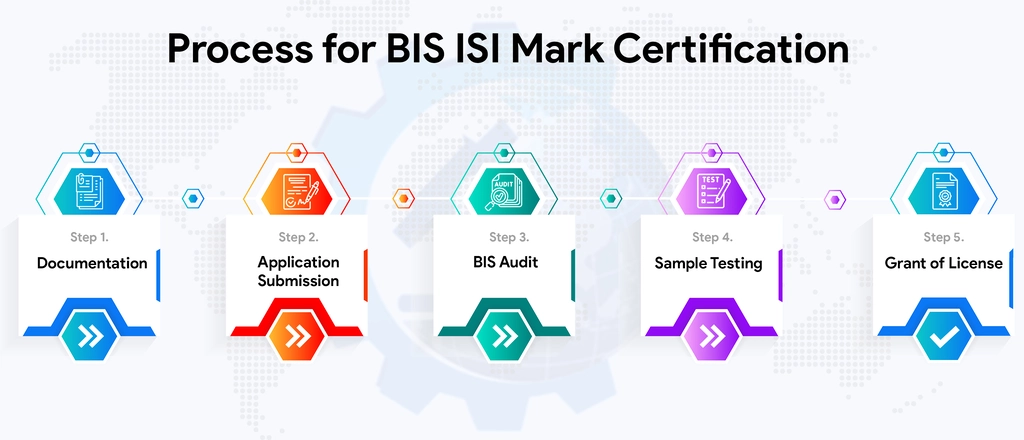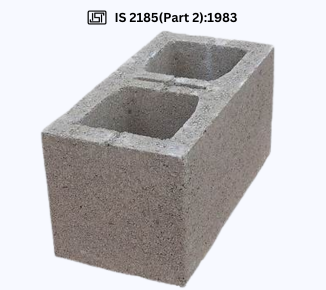BIS CERTIFICATION for Concrete Masonry Units - Hollow And Solid Lightweight Concrete Blocks IS 2185 (Part 2)
Published Date: September 19, 2024
Introduction
IS 2185 (Part 2):1983 lists the minimum requirements in the manufacture of lightweight concrete blocks, both hollow and solid, for structural and non-structural uses in buildings. In the standard, BIS has brought assurance that such blocks would conform to rigorous quality and performance standards. Certification by BIS under the standard is thus important in enabling manufacturers to confirm their products against high-expected standards of durability and structural strength. In addition, it adds value to the marketability of blocks while at the same time ensuring that construction builders and customers have the confidence that the blocks are going to be efficient for construction.
Lightweight concrete blocks, therefore, must be BIS certified since it has ensured that whatever products they are manufacturing have met the minimum threshold laid down by the Bureau of Indian Standards on quality and performance. This will help one ensure that the blocks are solid, durable, safe, and meet all the set regulatory requirements. What this means in construction projects is that only the materials matching the high standards of safety and quality concerns in the structural integrity and specifications of the project remain. This surely will guarantee builders and contractors reliable block performance, reducing the potential risk at the construction site.
Fast urbanization, combined with a greater awareness of environmental sustainability and energy efficiency, has created an unbelievable demand for lightweight concrete blocks within the Indian context. People increasingly prefer a tendency towards lightweight concrete blocks which ensure energy efficiency while causing minimum environmental degradation with the ever-growing demand for eco-friendly construction practices. Thus, continuity of performance and assured quality play an important role in meeting project deadlines besides ensuring safety. With such a market, this makes BIS-certified blocks very significant. It also gives more credibility to the blocks among builders and contractors, hence improving their standing in the competitive building industry.
End uses:
- Structural Applications: These concrete blocks are used in the construction of load-bearing walls, providing strength and stability for various types of buildings.
- Non-Load Bearing Walls: Lightweight concrete blocks serve effectively for partitioning and interior walls, offering good thermal and acoustic insulation properties.
- Architectural Finishes: The blocks can be used in external facades and decorative applications, enhancing aesthetic appeal while maintaining durability.
Overview of IS 2185 Part 2: 1983
The Indian Standard IS 2185 Part 2: 1983 deals with lightweight concrete hollow and solid blocks. This standard covers dimensions, compressive strength, density, and thermal insulation properties. Scope of IS 2185 Part 2:1983 The IS 2185 Part 2: 1983 also describes the manufacturer process and testing procedures besides quality control measures to be adopted to ensure that the blocks conform to such characteristics necessary for safe and efficient use in buildings.
Key Aspects of IS 2185 Part 2: 1983
- Material Specifications: Defines the composition, quality, and types of materials used for hollow and solid lightweight concrete blocks.
- Performance Requirements: Establishes criteria for strength, durability, thermal insulation, and moisture resistance for the concrete blocks.
- Safety Needs: Outlines safety measures related to handling, installation, and structural integrity to ensure user safety.
- Testing and Compliance: Details the testing methods and procedures to ensure products meet specified standards and performance criteria.
Key highlights
| Product Name | Hollow and Solid Lightweight Concrete Blocks |
| Applicable Indian Standard | IS 2185 (Part 2):1983 |
| Applicable Certification Scheme | Product Certification Scheme (ISI Mark Scheme) Scheme 1 |
| Applicable Mark: | BIS Standard Mark (ISI Logo) |
| Compliance Requirement | Mandatory |
| Quality Control Order | Click here |
| Ministry | Ministry of Housing and Urban Affairs |
| Scope as per Standard | This standard ( Part II ) covers the following lightweight· concrete masonry building units which are used in the construction of load-bearing and non-load-bearing walls: Hollow ( open and closed cavity) load-bearing concrete blocks. Hollow (open and closed cavity) non-load-bearing concrete blocks. Solid load-bearing concrete blocks. Solid non-load bearing concrete blocks. |
Applicable Tests
- Surface texture and finish
- General
- Block density
- Water absorption
- Cement
- Fly ash
- Aggregates
- Water
- Additives or Admixtures
- Moisture movement
- Drying shrinkage

Note
For Detailed Information about the Procedure for BIS ISI Certification, Visit :
Timeline for BIS Certification
The approximate timeline to obtain BIS certification for Concrete Masonry Units - Hollow and Solid Lightweight Concrete Blocks to use the ISI mark as per IS 2185 (Part 2):1983 is as follows:
- For Indian Manufacturers (Standard Timeframe – 30 days)
- For Foreign Manufacturers (Standard Timeframe – 180 days)
Benefits of BIS Certification
BIS certification offers several significant benefits:
| Benefit | Description |
|---|---|
| Access to the Indian Market | BIS certification is a prerequisite for selling these blocks in India, ensuring compliance with local regulations. |
| Compliance with Indian Standards | Certified blocks meet the stringent quality and safety standards established by BIS. |
| Enhanced Product Credibility | BIS certification enhances the credibility of the product, making it more attractive to builders and contractors. |
| Increased Customer Trust | Customers are more likely to choose BIS-certified blocks, knowing they meet high standards for quality and safety. |
| Benefits for MSMEs | Small and medium-sized enterprises (MSMEs) can gain a competitive advantage by offering BIS-certified products, ensuring they meet market demands for quality. |
Case Studies
One of the projects is fairly large scale and had to be able to adopt sustainable and energy-efficient building materials to meet the environmental and budgetary targets. The selected project chose BIS-certified hollow and solid lightweight concrete blocks, which allow for great thermal insulation and hence reduce the usage of extra cooling mechanisms significantly. The use of such blocks contributed not only to faster construction but also to efficiency in energy usage by the homeowners, hence making the project successful in terms of sustainability and cost-effectiveness.
Conclusion
Lightweight concrete hollow and solid blocks are one of the indispensable building materials in today's modern construction to provide good strength, insulation, and ease of laying. In this respect, all the blocks should be certified by BIS under IS 2185 [Part 2]: 1983 to meet the highest quality and performance standards and hence enable one to undertake the best construction venture. ALEPH INDIA is one of the major players in offering product certification services, offering services to help the manufacturer get this certification. Its professionalism ensures lightweight concrete blocks fully meet severe requirements according to IS 2185 (Part 2): 1983, thus giving more credibility and better marketability of the products. Lightweight concrete blocks by BIS- Aleph India-certified will remain one of the most integral building elements in the construction business with the growing demand for compliant and more eco-friendly building materials.
Aleph INDIA has been serving the industry as a single-window operator for all product regulatory compliance. We can assist importers or manufacturers in meeting all criteria for importing or selling a product in the Indian market.
Frequently Asked Questions
International Audits & Participation
Testimonials
BIS REGISTRATION FOR ELECTRONIC & IT PRODUCT
In the era of globalization, world trade is growing rapidly and henceforth, Manufacturing and Import/Export businesses are also growing drastically...View More
BIS CERTIFICATE FOR FOREIGN MANUFACTURER
The Economy of India-the fastest developing economy on the globe with the capabilities that help it matches up with the biggest international...View More
PRODUCT CERTIFICATION SCHEME (ISI MARK) FOR DOMESTIC MANUFACTURERS
Anything a person buys from food to cars, clothes to electronics, branded to unnamed products there is always a question that wanders in one’s...View More
WIRELESS PLANNING AND COORDINATION (WPC)
WPC: Wireless means communication done from one point to another point without the wires and cables. Electromagnetic waves carry the ...View More
BUREAU OF ENERGY EFFICIENCY (BEE) CERTIFICATE
BEE CERTIFICATE: Energy is the future, and its conservation is the way of the bright future. Everyone claims the environment is important...View More
E-WASTE MANAGEMENT
E-waste is one of the world's fastest-growing trash streams. We currently manufacture almost 50 million tones of it each year...View More
View All Services
Request a call back.
Would you like to speak to one of our Senior Technical advisers over the phone? Just submit your details and we’ll be in touch shortly. You can also email us if you would prefer.






























